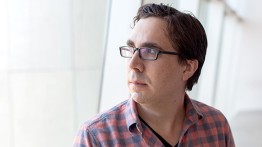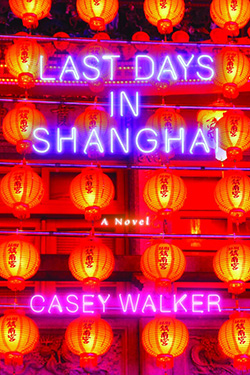Casey Walker and His "Last Days in Shanghai"
POSTED ON: March 17, 2015

Casey Walker: March 2015. Photo by Joao Enxuto/The Cooper Union
This past December Casey Walker, adjunct assistant professor in the Faculty of Humanities and Social Sciences as well as a writing associate in the Center for Writing, saw his first novel, Last Days in Shanghai, published to critical acclaim. Reviewers in the New York Times, the Times Literary Supplement and Kirkus Reviews have commended the novel for its spot-on depiction of booming Chinese cities, their enormous chaos and promise. “Walker’s achievement is to turn this landscape into a reflection of our own inner turmoil,” Leslie Chang, author of Factory Girls: From Village to City in a Changing China, wrote in the New York Times Book Review.

"I was really pleased with the response," Professor Walker said when we spoke with him recently. He meticulously researched contemporary China and worried that his depiction should ring true. As an outsider he knew he could never fully understand the country. "I think of a quotation by Flannery O’Connor: 'There's a certain grain of stupidity that the writer of fiction can hardly do without, and this is the quality of having to stare, of not getting the point at once. The longer you look at one object, the more of the world you see in it.' "
For Walker, little induces that necessary bit of ignorance as effectively as travel. “Dislocation, unfamiliarity, shock—those are productive modes for a writer. All your senses are more alive.” Walker’s first trip to China in 2007 convinced him that he would set a novel there, one that would find its hero in the throes of the very kind of confusion and turmoil O’Connor prescribed for writers.
The result is Last Days in Shanghai, published by Counterpoint Press. It follows Luke Slade, a young assistant to shady American congressman Leonard Fillmore, who travels to China with his boss on a trip meant to shore up the congressman’s self-proclaimed credentials as an Asia expert. Slade is undone from the start: his phone doesn’t work, he’s lost the trip schedule, and he’s been commanded by Fillmore’s wife to keep his boss on a tight leash. As she puts it, “Make sure he takes his meds. No booze. No whores. I’m serious.”
But within hours of their arrival, Fillmore goes missing, and Slade, whose political stint has rendered him both cynical and incompetent, is immersed in the depraved corruption of an unregulated slugfest-for-dollars that is the Chinese development boom. As Fillmore’s stand-in he is dined, bribed, and accused of murder, pulled in at a pace that leaves him blindsided and shaken. Along the way, though, he is an able reporter, clear-eyed about the wholesale destruction of tradition in the race for modernity and power. Some of the novel’s best passages find Slade observing the ruins of Hutong houses soon to be replaced by cheap, concrete construction. About to leave Beijing in search of his boss, Luke says, “I suddenly felt in sympathetic contact with a world of bygone things, a world of ghosts. With the lone exception of the Forbidden City, what I saw in Beijing below was the manic destruction of every brick of the architectural past. It was like getting rid of the past tense of a language. The present tense was supermalls with eight lucky floors and big-box convention centers and starry hotels for people like me. Residents evicted in favor of those just passing through.”
Walker earned a PhD in English from Princeton in 2010 and wrote his dissertation about the ways that late 19th century novels are “in conversation with cities.” It was a tack that led him to foundational texts on the psychology of the city dweller, early sociologists like Georg Simmel and Robert Park who wondered what cities did to the human mind and tried to apply a scientific rigor to the question. To a certain extent, Walker took the same approach when researching Last Days. He read exhaustively about the country’s economy, its low level workers and its changing architecture. Slade is at sea in the frenetic streets of Beijing and Shanghai but as the writer, Walker felt he had to know everything his character was missing. He sees today’s China as analogous to New York of the early 20th century—a place filled with newcomers from rural towns thrust into the chaos of ruthless cities with awe-inspiring technology.
“The part of China I’m talking about is in total upheaval,” Walker says. “People are being pulled to the coastal cities where a new identity is available. It’s all happening so fast, so dizzyingly. That’s leaving some people absolutely adrift. The global business class is ostentatiously spending money, but there’s a vast underclass behind it that is left out of that prosperity.”
Before Last Days, Walker, who grew up in a small agricultural town 120 miles east of San Diego, tried to write a novel about contemporary southern California. At the time he found it was too familiar to generate that “grain of stupidity” he needs to write. But now, after spending six years on Last Days, he’s returning to California as subject matter for a new novel; this time, though, his story is set in the 1920s, making the landscape almost as unfamiliar as 21st century China.
This semester Walker is teaching the novels of W.G. Sebald, an author equally fascinated by dislocation who built many of his novels on stories he imagined by examining photos he found in flea markets, anonymous images that illustrate his novels. Walker finds that Sebald’s obsession with architecture and ruins is a good fit for Cooper students: “Artists/architect might get excited by the images, and there's a lot for the engineers to think about in terms of Sebald's interest in the functioning of complex systems. And everyone, I think, likes the poetics of ruins. So, really, Sebald has it all.”




